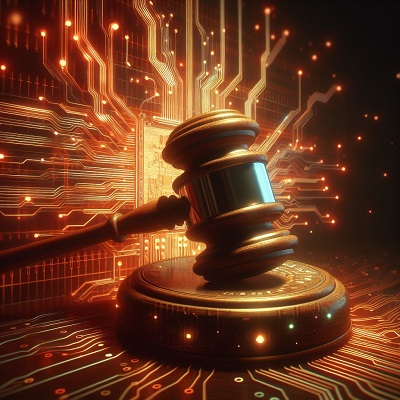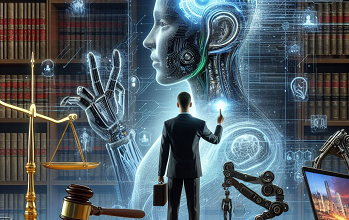In the hallowed halls of law firms, where precedent meets innovation, a quiet revolution is underway. Artificial Intelligence (AI) software is reshaping the legal landscape, empowering attorneys to navigate complex cases with unprecedented efficiency. But beyond mere productivity, these digital allies are also amplifying empathy—the beating heart of legal practice. Let’s explore how AI software is transforming law firms across the United States.
The AI Arsenal: Tools That Matter
AI Software for Law Firms: Revolutionizing the Legal Landscape with Efficiency and Empathy
The legal world, traditionally known for its adherence to precedent, is undergoing a quiet revolution. Artificial intelligence (AI) software is transforming law firms across the United States, empowering lawyers to navigate complex cases with unprecedented efficiency. But AI goes beyond just boosting productivity. These digital allies are amplifying empathy, the cornerstone of effective legal representation. Let’s delve deeper into how AI software is revolutionizing law firms and fostering a more empathetic legal practice.
The AI Arsenal: Empowering Lawyers with Intelligent Tools
Law firms today have access to a sophisticated suite of AI software, each designed to address specific challenges:
- Legal Research Revolutionaries: Legal research can be a time-consuming and tedious task. AI-powered legal research platforms like Westlaw Edge and LexisNexis are changing the game. These platforms act as tireless research assistants, meticulously sifting through mountains of case law, statutes, and regulations. They deliver insights, track legal trends, and streamline due diligence processes, allowing lawyers to focus on higher-level analysis and strategy development.
- Contract Companions: Ensuring Accuracy and Efficiency
Contract review is another area ripe for AI innovation. Tools like Kira and LawGeex are like having a team of meticulous paralegals on hand. They scan agreements with laser focus, identifying key clauses, pinpointing inconsistencies, and flagging potential risks. This not only saves lawyers valuable time but also ensures that contracts are airtight and protect clients’ best interests.
- Predictive Powerhouses: Foresight for Informed Strategies
AI is also transforming legal strategy. ROSS Intelligence and Casetext leverage sophisticated algorithms to predict case outcomes, identify relevant legal precedents, and even engage in natural language conversations. Armed with these data-driven insights, lawyers can develop more informed strategies and effectively advocate for their clients.
The Human Touch: Where AI and Empathy Converge
While AI offers a wealth of benefits, it’s important to remember that it is not designed to replace human lawyers. The power of AI lies in its ability to augment human capabilities, not supplant them. Here’s how AI fosters a more empathetic legal practice:
- Time Liberation: Space for Strategic Thinking and Client Relationships
By automating repetitive tasks like legal research and contract review, AI frees up valuable time for lawyers. This allows them to focus on building strong client relationships, developing personalized legal strategies, and delivering compassionate advocacy in the courtroom.
- Precision Partners: Ensuring Flawless Execution and Client Satisfaction
AI software doesn’t get tired or miss crucial details. It meticulously reviews contracts, conducts exhaustive research, and ensures deadlines are met. This precision translates to a higher standard of service for clients, who can rest assured that their legal matters are being handled with meticulous care.
- Client-Centric Insights: Empowering Informed Decisions
AI excels at analyzing vast amounts of data. This allows it to identify patterns, predict potential outcomes, and uncover hidden insights that might escape the human eye. Armed with this data-driven knowledge, lawyers can offer more informed advice to their clients, empowering them to make the best decisions for their unique situations.
1. Legal Research Wizards
- Westlaw Edge: This AI-powered legal research platform sifts through mountains of case law, statutes, and regulations. It’s like having a brilliant research assistant who never sleeps.
- LexisNexis: Another heavyweight in legal research, LexisNexis leverages AI to provide insights, track legal trends, and streamline due diligence.
2. Contract Companions
- Kira: A contract review superhero, Kira scans agreements, identifies key clauses, and ensures consistency. It’s like having a meticulous paralegal on steroids.
- LawGeex: This AI-driven contract review tool analyzes contracts lightning-fast, flagging potential risks and deviations. It’s the eagle-eyed editor every lawyer dreams of.
3. Predictive Pioneers
- ROSS Intelligence: Meet your AI legal research associate. ROSS predicts case outcomes, identifies relevant authorities, and even engages in natural language conversations.
- Casetext: Think of Casetext as your legal GPS. It guides you through the legal landscape, offering insights, precedents, and community wisdom.
The Human Touch: Where AI Meets Advocacy
AI isn’t here to replace lawyers; it’s here to amplify their impact:
- Time Liberation: By automating repetitive tasks, AI frees attorneys to focus on strategic thinking, client relationships, and courtroom advocacy.
- Precision Partners: AI doesn’t tire or overlook details. It ensures contracts are airtight, research is exhaustive, and deadlines are met.
- Client-Centric Insights: AI analyzes vast data sets, revealing patterns and predicting outcomes. It empowers lawyers to offer informed advice to clients.
Conclusion: The AI Advocate
As law firms embrace AI, they’re not surrendering their soul; they’re enhancing it. The future belongs to those who wield technology with compassion, who blend logic with advocacy. So, let the AI algorithms crunch data; the lawyers will continue to champion justice.



